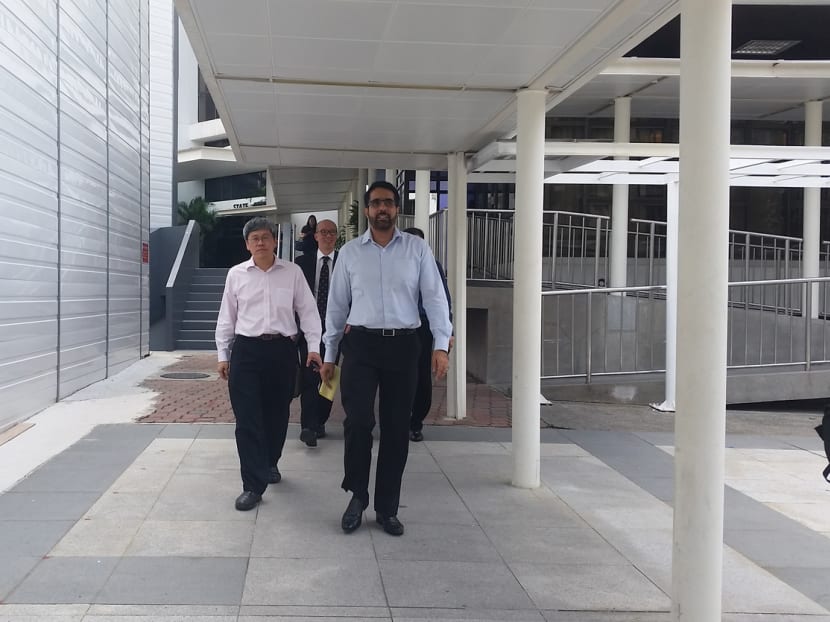AHPETC found guilty of holding fair without permit
SINGAPORE — The Workers’ Party-run Aljunied-Hougang-Punggol East Town Council (AHPETC) was yesterday found guilty of holding a Chinese New Year fair earlier this year without a permit. Sentencing was adjourned to Dec 24 and the town council could be fined up to S$1,000.

AHPETC vice-chairmen Png Eng Huat (left) and Pritam Singh leaving State Courts yesterday. Photo: Amanda Lee
SINGAPORE — The Workers’ Party-run Aljunied-Hougang-Punggol East Town Council (AHPETC) was yesterday found guilty of holding a Chinese New Year fair earlier this year without a permit. Sentencing was adjourned to Dec 24 and the town council could be fined up to S$1,000.
Delivering his oral judgment for almost two hours, District Judge Victor Yeo threw out what he described as “somewhat convoluted and perplexing” legal arguments by the town council’s lawyers. Ruling that the event fell under the definition of a “temporary fair” — and thus was subject to a permit under Section 35 of the Environmental Public Health Act (EPHA) — the judge said the argument by AHPETC’s lawyers that the fair should be construed as a “social and communal function” and a “mini fair” was “wholly misconceived and untenable”.
The judge also noted that at no point had AHPETC informed or sought clarification from the National Environment Agency (NEA) on whether a permit was required for its event.
“For the defence to now vigorously mount a challenge that there were no requirements for the town council to apply for a permit is simply unconvincing, to say the least, or a mere afterthought at worse,” he added.
Over the two-and-a-half-day trial last month, AHPETC’s lawyers also argued that the town council had the “lawful authority” to hold the fair, citing Section 18 of the Town Councils Act, which states that the functions of a town council include “to control, manage, maintain and improve the common property of the residential and commercial property in housing estates”.
It also argued that Section 35 of the EPHA is “substantively invalid” and does not apply to town councils, which are governed by the Town Councils Act.
Judge Yeo pointed out that, under the Town Councils Act, the Town Councils (Use of Common Property) Rules merely empower a town council to impose charges only for stipulated use or activities on parts of common property such as void decks, dismissing the argument of AHPETC’s lawyers that Section 35 of the EPHA and the NEA’s enforcement of the section against the town council would amount to “encroachment, bind and fetter upon the lawful powers, autonomy and reasonable discretion” vested upon any town council and its officers.
Judge Yeo said the Town Councils Act and EPHA had been enacted for a wholly different purpose and that they covered separate issues.
In enacting the Town Councils Act, it could not have been Parliament’s intention for the town councils to be exempt from the licensing laws of the land in their control and management of common property without expressly stating so, he pointed out.
It is also clear that the Town Councils Act covers municipal matters and allows town councils to regulate the use of parts of common property and impose charges for such use, while the EPHA is concerned with wider environmental and public-health concerns that affect the public.
The judge noted that the fair had been held in a public area in the vicinity of commercial shops and residential blocks, where considerable human traffic could be expected. The fair, which ran from Jan 9 to 30 at Hougang Central Hub, had five stalls.
“Given that the temporary fair operated for an extended period of time of three weeks … I am not able to lightly dismiss the prosecution’s contention of the potential disamenities and inconvenience associated …which could affect the pedestrian flow,” Judge Yeo said.
The judge ruled that AHPETC had not taken “reasonable care” to avoid committing the offence. He noted that for instance, there was no communication from AHPETC although the NEA warned that it would proceed with enforcement action if the town council commenced the fair without a permit.
“The facts of this case clearly do not support the defence’s contention that the town council had made a mistake of fact that it was either bound by law or justified by law to organise a temporary fair without a permit,” said Judge Yeo.
WP Members of Parliament (MPs) Pritam Singh and Png Eng Huat, who are the vice-chairmen of AHPETC, were at the hearing yesterday as the judge read out his verdict. They issued a media statement saying that they were disappointed with the ruling. “But we will consult our lawyers on our legal options and do not rule anything out,” the statement added.
Mr Singh also told reporters outside the court that the WP MPs are contributing to the lawyer fees and “no town council funds will be touched pertaining to this case”.






